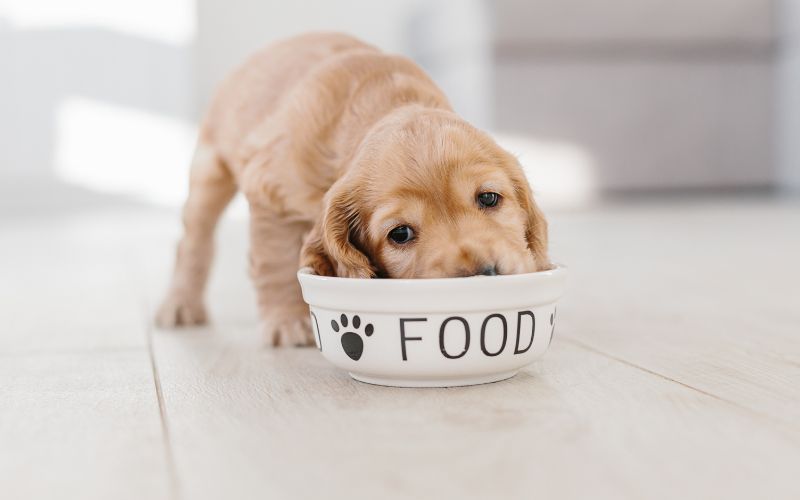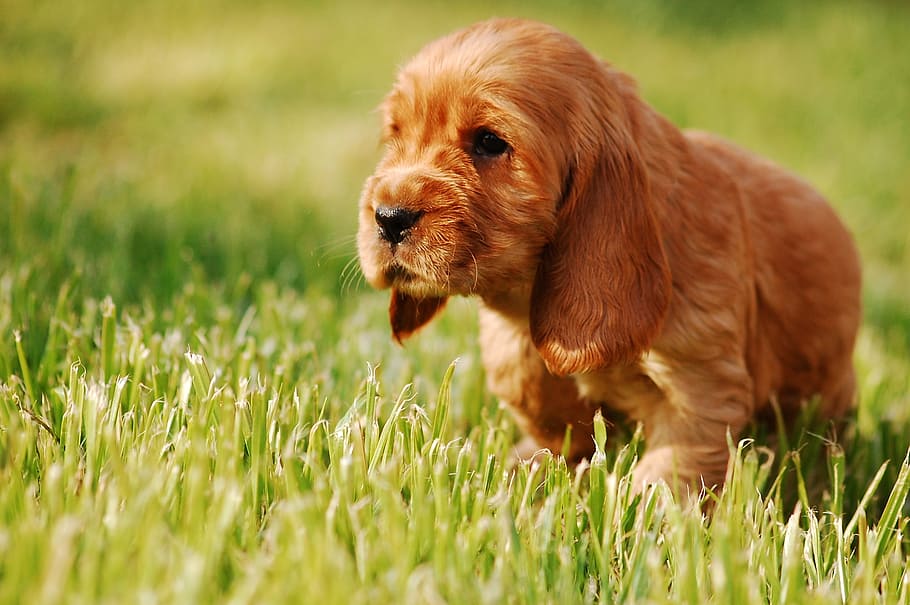Getting a Cocker spaniel can be an great time for both the new and experienced dog owner and bringing a puppy home has many responsibilities, so knowing how to bring up your Cocker spaniel puppy is important.
With a bit of planning and knowledge, bringing up a Cocker spaniel puppy is not difficult and can be fun for the whole family. Cockers are keen, intelligent dogs and a puppy that is cared for properly will soon adapt to his new home.
Bringing your puppy home
When your Cocker Spaniel puppy comes home you should remember that at first he will be frightened, confused and probably apprehensive.
You should appreciate that he is in a very strange place that has weird looking things, strange smells, noises and lots of other stuff that he doesn’t know, recognise or understand.
Remember that your puppy is only a baby and that he will need your help and care to help him to settle into his new home.
For a while he is going to be unsure, maybe anxious and potentially frightened, so look after him.
Make sure that he has a nice comfortable and warm bed where he can retire for a rest and a sleep whenever he needs to.
Try to think puppy
As a new Cocker spaniel puppy owner you should do your best to dispel your puppy’s fears.
You need to be cheerful and encouraging with your new puppy.
Let him to explore his new home and to help him to become familiar with where he lives and spend as much time as you can with your puppy, play with him and give him lots of affection and praise.
Always try to remember that he is a baby and needs you to look after him. He wants to be with you and please you so try and see things from this little dog’s perspective.

Take things slowly with your spaniel puppy
Loud noises, crowds of strangers or hyperactive children may scare your puppy and you should take care during these types of encounters.
Under no circumstances should you use any harsh words or punishment towards your puppy and, at all times you should remember that he is only a baby.
He needs love, affection, encouragement, praise and, if you treat him harshly and badly then he will grow to be fearful of you.
If you want to know how to bring up a Cocker spaniel puppy the easiest answer is with patience, encouragement and love.
Most modern Cocker spaniel puppies are incredibly soft and sensitive and a slow, careful approach will work wonders in the long term.
The wider world for your Cocker Spaniel puppy
Once your puppy has settled down in his new home you should help him to meet other people and to encounter and experience different situations, by helping him to do this you are reducing the potential for difficulties or for him becoming upset when he is older.
If men, women, children or people in general are not common features within your household then considered arrangements should be made for your Cocker spaniel puppy to be introduced and meet those types of people.
Your puppy needs to become familiar with the wider world and, as soon as he is old enough and has had his vaccinations, you should take him to as many different places as possible.
Introduce him to the beach, forests, town and let him meet other people, including children and other animals too.
When your puppy is old enough and it is safe to do so, you should take him on regular car journeys with an exciting walk or adventure at the end.
Puppies love to play so take some toys with you when you go out, such as a ball or similar.
Play games with your puppy and get to know him.
Taking the puppy in the car
Don’t make the car journey too long at first, a few minutes, if possible during the early stages to get him familiar with the car – it’s smell, motion etc, will be enough in the early stages.
Walks and excursions should always be one of the main highlights of your puppy’s day.
They should always be pleasant, exciting and enjoyable affairs.
Take your puppy to lots of different places – to the moors, the fells, the woods, the beach – anywhere where he can get different experiences to build up his confidence and knowledge.
With puppies, particularly spaniels and Cocker spaniel puppies, the emphasis is on variety.

Important points when bringing up a puppy
So here are a few tips to guide you through the early stages of your cocker spaniel puppy.
The first 6 weeks
It is important for this time frame to be as stress free as possible for your new cocker pup, so it helps if he can be with his mother and siblings for at least the first six weeks of his life.
This way he will benefit from all the stimulation and education that pups get from their mother, siblings and other animals in the home.
This is a good time for your new puppy to learn some of his lines as he is already used to living with his mother and sisters, so feeding at frequent intervals will be a natural part of his life.
At six weeks, your cocker spaniel puppy should have had its first vaccination and vet check up.
The next step is to choose a vet that can provide regular inoculations for your puppy as he grows older.
Feeding
Puppies generally eat 3 or 4 meals a day until they are 6 months old, although some breeders will try and get them used to just two large feeds by 12 weeks.
After six months, most dogs become more dependent on just one main feed per day , although some owners still like to feed 2 or 3 times a day for ease.
Exercise
All cocker spaniel puppies should be given the opportunity to exercise at least three times daily and you can add in short play sessions (10-15 minutes) during the day if you like, but take care not to overdo it as puppy’s bones grow very quickly.
You may also find that your puppy prefers to have a nap between exercise sessions – just let him sleep if he needs it.
Worming
Your new cocker spaniel puppy should be wormed every 2 weeks from 2-3 months old, and then monthly until 6 months old, followed by three monthly worming from this age onwards.
Your vet will advise you as to the best worming treatment to use.
Type of food
Your puppy should be fed a high quality food, but this does not need to be expensive.
A good brand of complete dry food is fine for your dog’s first few months, after which you can change to either a medium or top grade complete food, depending on the individual dog’s condition and activity level.
Feeding your puppy is an important part of bringing him up and you should only ever let him drink fresh, clean water.
Keep all of his dishes clean to prevent illness.
Our chosen puppy food
[amazon box=”B000VJXWXC” template=”horizontal” title=”Easy Spaniel Training Puppy Food Choice” description=”Our favourite food for spaniels that we’ve fed for over 30 years”]
FAQs
What is the ideal diet for my Cocker Spaniel puppy?
A Cocker Spaniel puppy should have a balanced and nutritionally complete diet. Look for high-quality puppy food that’s rich in protein and has the correct balance of carbohydrates, fats, vitamins, and minerals. The food should be appropriate to the breed size. Remember to control the portions to prevent obesity, a common issue in Cocker Spaniels.
How often should I exercise my Cocker Spaniel puppy?
Cocker Spaniels are energetic dogs and need a reasonable amount of exercise. At the puppy stage, a few short walks, along with playtime each day, should be enough. As they grow older, they will require more exercise – usually up to an hour a day. However, remember not to over-exercise your puppy while their bones are still growing.
How can I toilet train my Cocker Spaniel puppy?
Consistency is key when toilet training your Cocker Spaniel puppy. Take your puppy outside frequently – this could be every hour, as well as when they wake up, during and after playtime, and after eating or drinking. When your puppy goes to the toilet successfully, give them lots of praise and a treat as a reward.
How should I socialise my Cocker Spaniel puppy?
Socialisation is essential for your Cocker Spaniel puppy’s development. Introduce them to a wide variety of people, dogs, and other animals, as well as various environments, noises, and situations. Ensure these encounters are positive experiences for your puppy to help them grow into a confident, well-rounded dog.
At what age should I start training my Cocker Spaniel puppy?
You can start basic training, like sit, stay, and come, as early as 8 weeks old. Socialisation should also start at this age. More complex training, like heel or fetch, can be introduced a bit later, around 4 to 6 months of age. Remember, Cocker Spaniels are intelligent and eager to please, making them generally receptive to training. Always use positive reinforcement techniques.
Final Words
Your young spaniel lives for adventure, it is in his genetic makeup and he wants to run, chase his nose, scent, sniff, have different experiences and enjoy life.
Your puppy needs to see as much of life as possible and to visit as many different places as it is practical to take him to.
Time and care taken at this early stage and a considered investment in your puppy’s development will all help your Cocker spaniel puppy to grow into a well balanced, happy adult dog who enjoys life to it’s fullest and who is a true character.
Do your best to make his life as enjoyable as possible.
Train yourself to understand dogs more.
Find good books and articles and watch/listen to different dog experts – there are always things that we can learn.
Dogs are complex, clever and intelligent animals, they are great companions, loyal and loveable and a typical Cocker Spaniel puppy will be with you for many years.
Learn as much as you can. Owning a Cocker Spaniel is great fun – enjoy it.




